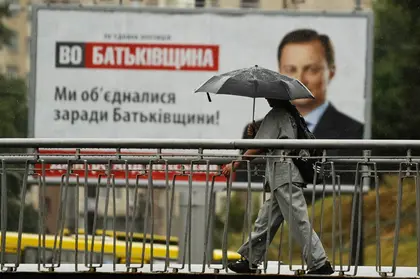In response, however, some are promoting new legislation to improve the accountability and transparency of campaign financing in the future.
The gap is huge between what candidates and parties declare they spent versus what is really spent, according to a survey by Opora, a non-governmental election monitoring group.
JOIN US ON TELEGRAM
Follow our coverage of the war on the @Kyivpost_official.
“Candidates’ spending was several times more than the income they reported in their 2011 tax declarations. Also, candidates didn’t use (small donations from people), so the source of funding is extremely obscure,” Opora’s report says about the constituencies it monitored. “It gives grounds for corruption (once the candidates get elected).”
With no institutions to police campaign spending, nothing in the legislation prevents politicians from submitting bogus, if any at all, financial reports.
“Only half or so of single-constituency candidates have submitted reports about their campaign spending,” said Mykola Nebogatikov, head of the finances control department in Central Election Commission. “We’ve sent letters to others, but that’s all we can do. Law doesn’t provide any punishment for those who didn’t file the report. Some candidates actually responded saying that they’re not going to report anything because they’ve lost elections anyway.”
Observers are rather pessimistic about candidates’ reports.
“In general, candidates spend about three times more than they officially report to spend,” adds Olha Aivazovska, coordinator of Opora’s election programs.
For parties, the situation is even worse.
Denys Kovrizhenko of the International Foundation for Electoral Systems Ukraine says spending by political parties can be up to 10 times more than what they report afterwards.
Before the elections, political technologist Taras Berezovets estimated that the pro-presidential Party of Regions’ campaign would cost about $200 million, based on the scope of party’s advertising and campaign work. However, the official report submitted to the CEC after elections declared party spending of $27.3 million.
The Regions’ main rival, United Opposition, reported spending $13.4 million, while Berezovets estimated its campaign to have spent $130 million.
Two other big spenders, UDAR and the Communist Party, also reported spending about eight times less than estimates.
But money only earns votes when it is invested smartly.
That was proven by the example of two big losers, Ukraine-Forward Party and former President Viktor Yushchenko’s Our Ukraine.
Yushchenko’s party reported spending nearly $8 million with only 1.1 percent of the vote to show for it.
Ukraine-Forward, which filled Ukraine with an enormous amount of street advertising and other media spending, has reported that the campaign cost less than $10 million. However, experts estimate the party’s campaign cost $150 million. Big investments – allegedly from pro-governmental oligarchs – didn’t buy Ukraine-Forward a single parliament seat. It got only 1.58 percent of the votes.
To stop the obscure financing which prevents voters from knowing who is bankrolling the campaigns, activists are ready to work on improving political financing legislation.
“There are people in new parliament who are ready to work with us on it. They come from all parties,” Aivazovska of Opora says.
Aivazovska expects the Verkhovna Rada to support greater campaign transparency on principle. “It has to do with their conscience. Those, who still have dignity, they care,” she said.
Ukraine, Aivazovska says, also needs to adopt foreign practices of financing political parties from the state budget, with the amount tied to the level of electoral support.
Another problem is enforcement.
The CEC doesn’t have any legal power to perform checks, investigate finance issues or punish violations. “A separate institution must be created to control financial resources spent on campaigns.” Aivazovska said.
A third step is to limit campaign spending for political parties.
According to Aivazovska, limits will help political parties shed their heavy dependence on oligarchs who make huge investments into their campaigns and expect the favors to be returned. Moreover, activists are pushing for the identity of contributors to be public.
Aivazovska is optimistic that progress will be made before the next scheduled parliamentary election in 2017. “Five years is a very long time, I’m sure we will finish the job in time,” she said.
Kyiv Post staff writer Olga Rudenko can be reached at rudenko@kyivpost.com.
You can also highlight the text and press Ctrl + Enter





